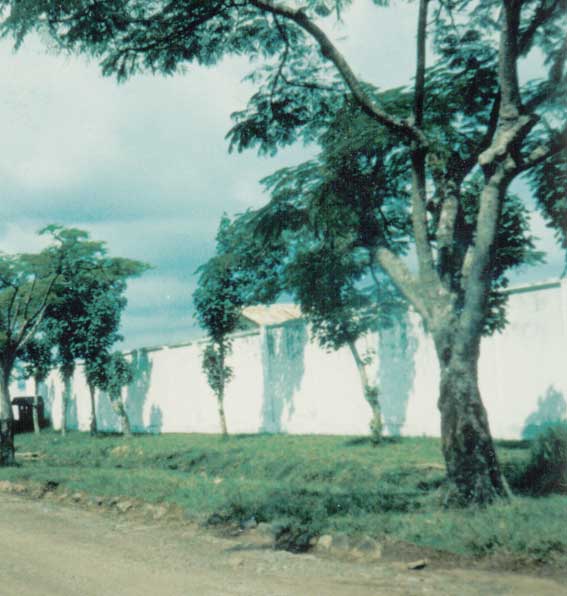And again we are prisoners
Two girls of my age asked me if I would like to come with them since they had planned to go swimming. Oh yes, of course I was coming with them, swimming that really sounded like music in my ears, so off we went to the small swimming pool not too far from our prison. Quite some young Indonesians were watching us, some of them were laughing and waved at us, but others looked quite angry. We swam for about half an hour, and took another half an hour to get our clothes dry again while sitting in the sun and then the three of us walked happily back “home” again.
That was the last time we could go outside the prison, we were ordered to stay inside because young Indonesians were trying to kill the Dutch prisoners, so we were told. The Indonesians refused to accept a Dutch government again, Sukarno was now the president of Indonesia. And again the gate of our prison was closed, we now had Japanese soldiers protecting us against those angry young Indonesians. The lovely Indonesian woman who had been so kind towards my mother, sisters and me was no longer allowed to enter our prison, we missed her.
I also began to worry how my father could find us while this prison was locked again. But then I saw that several Dutch men were walking through the gate so I understood that the Dutch men could still travel over Java and find their family back, but this was very risky. I also saw some women leaving the prison, they said that they were going “ home”, and that sounded real good. After the war we learnt that thousands of ex-war prisoners were killed by the permuda 's ( young rebels) they were not regular soldiers from the Indonesian army.
One morning Henny and I saw one of the Japanese soldiers, who were protecting us against the permuda's, crying his heart out. Someone asked the Japanese why this soldier was crying. They told us that a terrible bomb had killed this man's whole family. We felt very sorry for him, but we didn't know anything about the big bomb they were talking about, only much later did we learn about the Atom bombs on Hiroshima and Nagasaki.
Another day my mother and I were carrying our washtub to fetch water from our prison well, when some permuda's started shooting at us while they we hiding in the trees outside our wall. I cried out to my mother to lay down on the ground. Luckily we weren't wounded, but since we needed the water badly we quickly gathered some water from the well and then walked back to our cell as fast as possible.
My mother was shaking all over, and this accident touched my sister Henny deeply, she was shocked that those young Indonesians were trying to kill the helpless Dutch prisoners, who couldn't do anything back and were hardly protected.
About two weeks later the Japanese soldiers left us and the Ghurka's , the soldiers from Nepal who served in the British army, came to protect us. They say that the Ghurka's were the best British soldiers. A bit later Sikhs from India arrived as well, they were looking after several water tanks, so now at least we could take a good bath and clean our clothes.
Our food was still very simple, but a lot better than during the war. We also received food from the sky, parachute's came down and brought us corned beef, biscuits, chocolates, cigarettes, milk powder, sugar, coffee, soap and so on. Several ladies took the parachutes and made clothes for their children or for themselves. But one lucky day I received a part of a parachute as well, I was very happy, and my mother made me a beautiful blouse. Yes life was definitely better than before, the only trouble was that we were still living behind those walls while the war was over.
I started helping cleaning up the gudang's, (stores) where the Japanese had dumped all sort of things. We found out that there were many boxes full with anti-malaria tablets, quinine, and several other medicines that could have saved the lives of the many who died in this prison. We were really shocked when we found this out, but even more so when we found a few cards written to some of the women staying in our prison, they never received their cards during the war, this was disgusting and very sad.
There were more and more European men entering our prison to join their wife and children, and most of the time whole families took the big risk and left this dirty stinking prison.
But our father didn't come yet, we also had no news from him. But of course he was in a Kempeitai prison in Malang, that could make it more complicated to come over to Banyu Biru. He also had to travel alone, the other men came from camps in our neighbourhood and they usually came walking together in a group. Maybe my father tried to organise something to get my mother, my two younger sisters and I to Malang.
Maybe my mother would soon receive a letter from my dad.

Banyu Biru, picture was taken after the war

